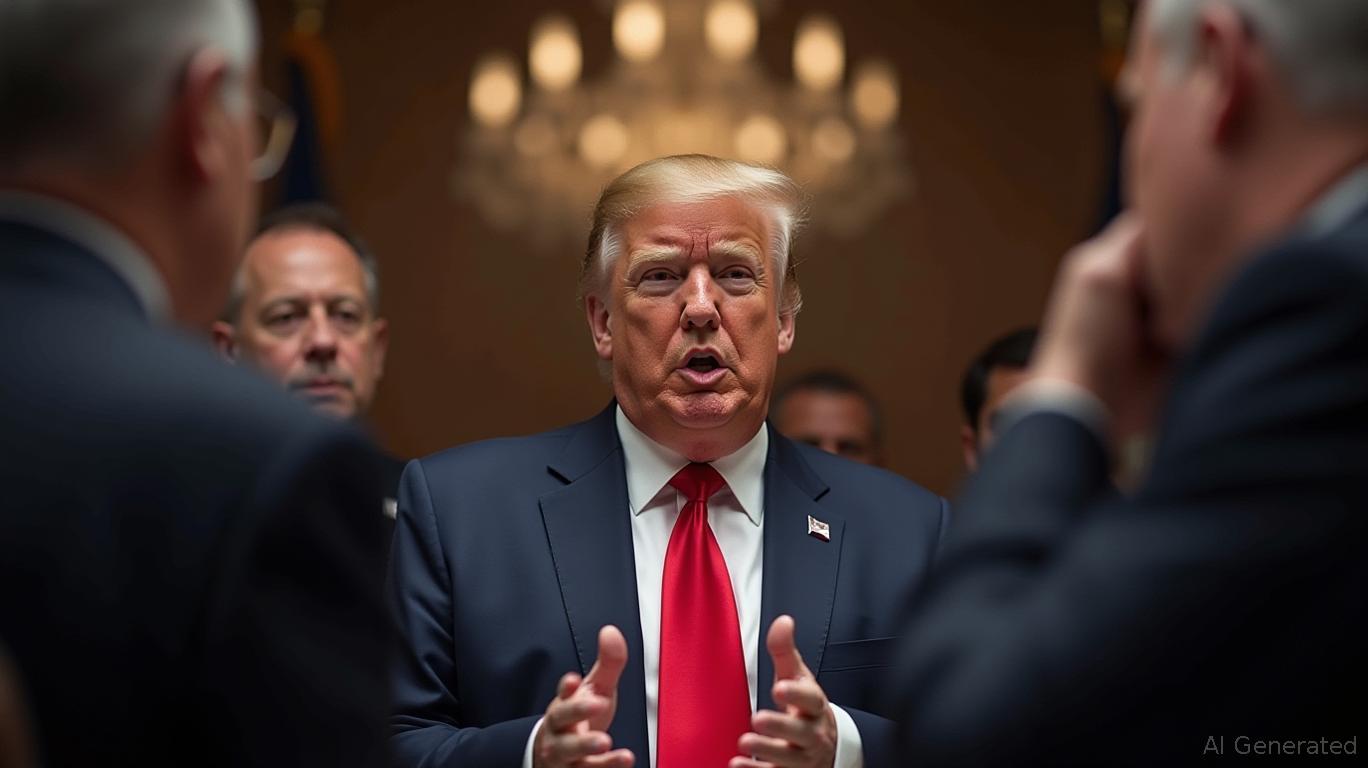U.S. Crypto at a Turning Point: Trump’s Clemency or Legislative Protections
- Trump's full pardon of Binance founder CZ erased his anti-money laundering conviction, sparking congressional ethics debates and market volatility. - Rep. Khanna introduced a bill banning U.S. officials from crypto ownership/trading, citing conflicts after CZ's firm supported Trump-linked projects. - BNB surged 8% post-pardon while Bitcoin hit $110,700, reflecting crypto markets' sensitivity to political decisions and regulatory shifts. - AI-driven trading platforms like CenionAI are emerging as financia
The complete pardon granted by U.S. President Donald Trump to Binance founder Changpeng Zhao (CZ) has sparked intense ethical and regulatory controversy. In response, Congresswoman Ro Khanna has put forward a bill aimed at limiting the involvement of public officials in the cryptocurrency sector. This pardon,

Khanna’s legislative proposal seeks to prohibit U.S. officials, their relatives, and members of Congress from creating, owning, or trading cryptocurrencies—directly addressing the aftermath of the CZ pardon. The bill would expand current stock trading limitations to include digital currencies, aiming to curb corruption and foreign interference. In an interview with MSNBC, Khanna stressed that pardoning a “convicted billionaire who facilitated funds for terrorists and child abusers” erodes public confidence. The legislation also targets the surge in crypto industry lobbying that followed the conviction.
This pardon fits into Trump’s broader “Crypto America” strategy, which involves rolling back Biden-era enforcement efforts such as the Justice Department’s crypto task force,
At the same time, the crypto market’s sharp fluctuations highlight its vulnerability to political shifts. Data from Polymarket indicates that the likelihood of Sam Bankman-Fried receiving a pardon rose to 12% after CZ’s release, and analysts at BiyaPay foresee increased investment in highly liquid assets such as
In the midst of these changes, AI-powered quantitative trading platforms are becoming central to the next wave of financial innovation. CenionAI, a fintech company registered in the U.S., utilizes artificial intelligence algorithms to run trading strategies around the clock, promising “consistent and transparent returns,”
Khanna’s bill is encountering pushback from both sides of the aisle, with pro-crypto legislators arguing that such restrictions could hinder industry growth. Still, with more than 50 million Americans now owning digital assets, the discussion over ethical oversight in crypto is growing more urgent. The U.S. faces a pivotal decision: whether to adopt Trump’s more lenient approach to crypto or to implement stricter measures to prevent conflicts of interest.
As both markets and regulators adjust, the combination of CZ’s pardon and the rise of AI trading marks a significant turning point in global finance—where political power, technological progress, and ethical considerations intersect, as covered by Coinotag, CryptoNinjas, and CoinLaw.
Disclaimer: The content of this article solely reflects the author's opinion and does not represent the platform in any capacity. This article is not intended to serve as a reference for making investment decisions.
You may also like
Skims Appoints Beauty Lead to Champion Diversity, Signaling Industry Move Toward Black-Owned Brand Innovation
- Skims hires Ami Colé founder Diarrha N'Diaye as beauty EVP, signaling industry recognition of Black-owned brands' role in driving inclusivity and innovation. - N'Diaye's appointment follows Ami Colé's 2025 shutdown due to unsustainable costs, yet its legacy of inclusive products and community focus left lasting industry impact. - Skims Beauty aims to extend size/shade inclusivity to cosmetics, leveraging N'Diaye's melanin-rich skin expertise and prior experience at L'Oréal/Glossier. - The move highlights

DoorDash (DASH) up 22.23% in 24 Hours – Robust SNAP Program Fuels Rally
- DoorDash’s 22.23% 24-hour surge driven by Emergency Food Response initiative and Waymo autonomous delivery partnership. - SNAP program waived fees for food deliveries, boosting brand perception and operational reach through partnerships with major grocers. - Autonomous delivery pilots in Phoenix aim to reduce costs and expand service areas, aligning with 2028 $20.4B revenue targets. - Historical backtest showed no prior 22.23% daily gains, suggesting unique market conditions or short-term catalysts fuele
Trade Pause Prevents Further Tensions, Yet U.S.-China Technology Dispute Remains Unsettled
- U.S. and China announce "Busan Truce" at APEC summit, agreeing to cut tariffs, stabilize supply chains, and resume U.S. agricultural exports to China. - Tech tensions persist as U.S. maintains AI chip export bans on China, while China suspends investigations into U.S. semiconductor firms. - Global markets rise on trade optimism, but analysts warn past agreements like 2020's Phase One deal have failed due to noncompliance and geopolitical friction. - U.S. farmers gain short-term relief with China pledging

Walmart’s performance-based compensation approach ensures that managers’ interests are closely tied to the company’s achievements
- Walmart offers top U.S. store managers up to $620k annually, including stock grants, to align their interests with company performance and boost retention. - The 2024 compensation overhaul raised regional manager salaries to $160k and contributed to a 10% improvement in hourly worker retention over a decade. - CEO John Furner emphasized "owner-like" incentives, with shareholding influencing profit management, as Harvard Business School studies the strategy's business outcomes. - Walmart's approach mirror
